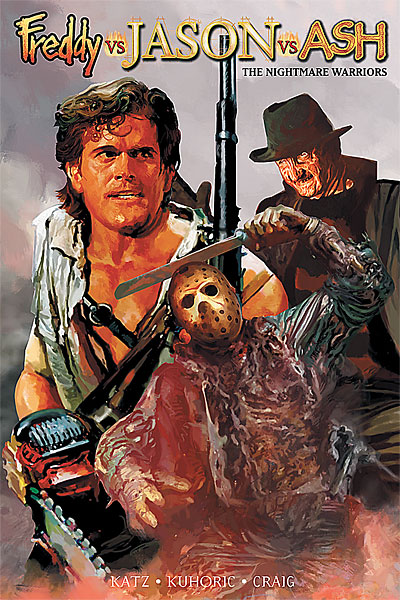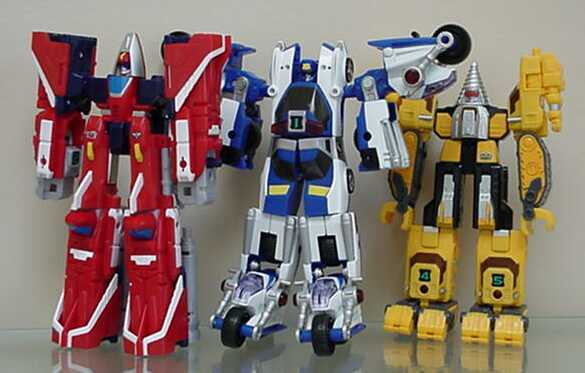Epic Fail: A Review of Freddy vs. Jason vs. Ash: The Nightmare Warriors
Franchise crossovers are tricky things. They can be a blast when characters from different narrative universes meet in a single setting and share an adventure, or beat the crap out of each other, or beat the crap out of each other and then share an adventure. This stuff isn't high art; it's more of a treat for franchise fans than anything else, which is good news if you're a franchise fan.
However, even fan-friendly stuff like crossovers still have to obey a few rules to be enjoyable stories and not just meandering, clueless cash-ins of popular franchise brand names. For starters, it helps to provide some kind of balance between the franchises that appear in the story, so that both sides have some kind of direct involvement in the story. There's a big difference between a crossover and a guest appearance: Fans of a particular franchise in a crossover will feel cheated if their side doesn't get enough time in the spotlight, and it won't help the crossover narrative achieve a sense of tonal and plot consistency if certain elements just seem forced into the story with little sense of explanation or continuity.
To ensure that narrative balance is achieved, the franchises within the crossover should share some kind of thematic commonality. Dark Horse's original Aliens vs. Predator
This brings me to the focus of this post, my review of Freddy vs. Jason vs. Ash: The Nightmare Warriors
When Freddy vs. Jason came out back in 2003, I thought it was a hoot. I enjoyed seeing Robert Englund playing Freddy Krueger one last time, and Ronny Yu's direction featured the right blend of gory horror and violent lunacy. The subplot involving the Westin Hills psychiatric facility and Hypnocil not only made ample use of ideas introduced in previous Nightmare on Elm Street movies, but it also provided an effectively morbid counterweight to the alliance/conflict between Freddy and Jason. Yet the most remarkable thing about this crossover was how long it took to happen at all and when it finally did happen, it was worth the wait. The studios first considered this crossover back in 1987, and it resulted in 18 unused scripts before Freddy vs. Jason was actually made (see the extras on the DVD
The success of Freddy vs. Jason prompted the studios to consider a sequel (naturally), and one of the sequel ideas that quickly bubbled to the surface was to add the character of Ashley "Ash" Williams from the Evil Dead
I picked up the trade paperback collection of Freddy vs. Jason vs. Ash after it was published in September 2007. It's not as good as Freddy vs. Jason, the artwork by Jason Craig is very uneven, and I doubt that it would've worked as a movie. Nevertheless, Freddy vs. Jason vs. Ash has its share of noteworthy moments for avid fans. It incorporates enough elements from each of the three franchises so that it feels like a complete, coherent story. Perhaps the most intriguing idea in this crossover story was the suggestion that Jason Vorhees' mother used the Necronomicon to bring Jason back from the dead (a plot thread that was hinted at in the ninth Friday the 13th movie
Katz, Kuhoric and Craig came back in 2009 to do Freddy vs. Jason vs. Ash: The Nightmare Warriors. Nightmare Warriors was originally slated to be a twelve issue miniseries, but it was cut down to six issues. Katz and Kuhoric aimed to tell a much more ambitious story in this sequel, setting it up to serve as a definitive ending to the stories of several surviving characters from the Friday the 13th and Nightmare on Elm Street movies. Unfortunately, while Freddy vs. Jason vs. Ash is an amusing romp, Nightmare Warriors is an ambitious disappointment.
Katz and Kuhoric obviously didn't trim their original idea for a sequel when the miniseries' number of issues was cut from twelve to six. Nightmare Warriors tries to fit too many characters and plot threads into a narrative space that's too small to accommodate them and as a result, it becomes little more than a collage of franchise parts that never really fit together into a whole story. Reading it felt like reading Katz and Kuhoric's Friday the 13th and Nightmare on Elm Street fanboy wish list, not a gleefully gruesome story that horror fans crave. The characters feel interchangeable and its two intersecting plot arcs--the assembly of a support group for Freddy and Jason survivors and the government's interest in the Necronomicon--read like shallow, uninspired excuses to bring the characters together instead of actual plot arcs. As before, Craig's quality of artwork continues to vary from page to page, thus further dulling the story's overall visual impact.
Such narrative overcrowding of Nightmare Warriors leads it to its biggest flaw, at least as crossovers go: a lack of balance between the participating franchises. There are so many characters and ideas from the Friday the 13th and Nightmare on Elm Street franchises that the Evil Dead components of the story--namely Ash, the Necronomicon, and the Deadites--feel like they've been pushed aside and only serve the story in the most perfunctory sense. If anything, such an imbalance calls attention to the fact that the Evil Dead franchise isn't a slasher franchise, thus making Ash's placement in the story that much more awkward. Katz and Kuhoric's plot point that slasher attack survivors have an inner strength that makes them much more capable of beating supernatural villains would've worked perfectly within the Hack/Slash
Had Katz and Kuhoric kept their ambitions in check and paid closer attention to what makes crossovers succeed, Nightmare Warriors could have been a great miniseries. Since Nightmare Warriors was intended to be a concluding chapter in a trilogy, it should have been a story that expands directly from Freddy vs. Jason and Freddy vs. Jason vs. Ash instead of returning to two of the original franchises to continue their stories. For example, since she brought Jason back from the dead by using the Necronomicon, Pamela Vorhees could have returned in the third part of the trilogy as some kind of Deadite witch (think of something along the lines of the cellar ghoul from Evil Dead 2
In summary, I can't recommend Freddy vs. Jason vs. Ash: The Nightmare Warriors, even to die-hard fans of Freddy, Jason and Ash. Horror buffs are better off satiating their crossover cravings elsewhere.







Comments
Post a Comment